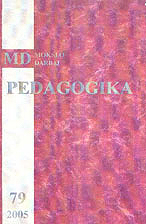Pedagoginės praktikos pokyčiai mokymosi visą gyvenimą kontekste
Changes of Pedagogical Practice in the Context of Life-Long Learning
Author(s): Vaida Jakubauskaitė, Loreta Montrimaitė, Giedra Marija LinkaitytėSubject(s): Education
Published by: Vytauto Didžiojo Universitetas
Keywords: life-long learning; pedagogical practice.
Summary/Abstract: The change in the meanings of educational goals and priorities alters the overall educational concepts. Thus, learning in a constantly changing world becomes a life long process. Therefore, teachers have to know new tasks – to create such a learning process, which would encourage a students’ learning, and at the same time would ensure the perspective of life long learning. The examination of scientific literature and educational documents reveal that pedagogical skills that emphasize knowledge transfer and the development of cognitive skills are becoming insufficient for teachers to meet new tasks. In the context of this analysis the one of the most important capabilities becomes a competence which can be described as an attitude to encourage teachers to develop theirs (as well as students’) learning to learn abilities, knowledge and skills that encourage to create a positive learning environment and to take the position of life-long learning. The hypothesis of the change in teachers’ competences allows authors to state a scientific problem: how to help a teacher to broaden the competences he / she already has, and to enable teachers to reflect on the teaching / learning experience. The goal of the research – to describe learning/teaching competence characteristics, and to construct a means, which would ensure the ability to measure the learning / teaching experience and the reflection of opportunities. In order to achieve the goal, the following activities were conducted: 1. The parameters and characteristics by which learning / teaching competencies were described in educational scientific literature and the documents of the European Union 2. The means were created, adapted and empirically tested for the fixing of teachers’ learning / teaching experience and reflection. 3. The process was developed which would ensure the measurement of teaching / learning process and carried out a research of a particular learning experience. The learning to learn competence can be described in three parameters: knowledge about the diversity of learning processes, the ability to model a learning activity, and attitude – responsibility for the active participation in the learning process. The results of empirical research revealed that the constructed method for reflective self-evaluation includes two means – one which is the “thinking map” and second the protocol of reflective self-evaluation. This method allows to fixate and evaluate the learning to learn the experience according to three parameters: knowledge, skills and the change of attitudes towards learning.
Journal: Pedagogika
- Issue Year: 2005
- Issue No: 79
- Page Range: 116-122
- Page Count: 7
- Language: Lithuanian

